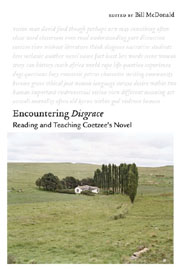Book contents
- Frontmatter
- Contents
- Acknowledgments
- Introduction
- I Reading Disgrace
- 1 “We are not asked to condemn”: Sympathy, Subjectivity, and the Narration of Disgrace
- 2 Beyond Sympathy: A Bakhtinian Reading of Disgrace
- 3 “Is it too late to educate the eye?”: David Lurie, Richard of St. Victor, and “vision as eros” in Disgrace
- 4 Disgrace and the Neighbor: An Interchange with Bill McDonald
- 5 To Live as Dogs or Pigs Live Under Us: Accepting What's on Offer in Disgrace
- 6 Tenuous Arrangements: The Ethics of Rape in Disgrace
- 7 Dis(g)race, or White Man Writing
- 8 Clerk in a Post-Religious Age: Reading Lurie's Remnant Romantic Temperament in Disgrace
- 9 Saying it Right in Disgrace: David Lurie, Faust, and the Romantic Conception of Language
- 10 The Dispossession of David Lurie
- II Reading Disgrace with Others
- Works Cited
- Notes on the Contributors
- Index
7 - Dis(g)race, or White Man Writing
from I - Reading Disgrace
Published online by Cambridge University Press: 12 September 2012
- Frontmatter
- Contents
- Acknowledgments
- Introduction
- I Reading Disgrace
- 1 “We are not asked to condemn”: Sympathy, Subjectivity, and the Narration of Disgrace
- 2 Beyond Sympathy: A Bakhtinian Reading of Disgrace
- 3 “Is it too late to educate the eye?”: David Lurie, Richard of St. Victor, and “vision as eros” in Disgrace
- 4 Disgrace and the Neighbor: An Interchange with Bill McDonald
- 5 To Live as Dogs or Pigs Live Under Us: Accepting What's on Offer in Disgrace
- 6 Tenuous Arrangements: The Ethics of Rape in Disgrace
- 7 Dis(g)race, or White Man Writing
- 8 Clerk in a Post-Religious Age: Reading Lurie's Remnant Romantic Temperament in Disgrace
- 9 Saying it Right in Disgrace: David Lurie, Faust, and the Romantic Conception of Language
- 10 The Dispossession of David Lurie
- II Reading Disgrace with Others
- Works Cited
- Notes on the Contributors
- Index
Summary
How are they to be figured, this man and he? As master and slave? As brothers, twin brothers? As comrades in arms? Or as enemies, foes?
— J. M. Coetzee, “He and His Man”My introduction to J. M. Coetzee's writing began with Disgrace, and a first reading of the novel did not dispose me kindly towards the author. I found the rendering of black South African characters truncated and skewed, Lucy's silence on her rape offensive: in short, I thought Disgrace was sexist and racist, an indulgence of a self-absorbed narrator. I fell into the camp of readers described by Derek Attridge as condemning Coetzee “for painting a one-sidedly negative picture of post-apartheid South Africa, representing blacks as rapists and thieves, and implying that whites have no option but to submit to their assaults.”
My ignorance of Coetzee's oeuvre was by design; I boycotted his writing precisely because he was Afrikaner and I rooted for the underdog, whom I saw as under-acknowledged black South African writers like Bessie Head, Alex la Guma, Lewis Nkosi, Ezekiel Mphalele, and Miriam Tlali, writers I began reading in graduate school in the 1980s at Coetzee's alma mater, the University of Texas at Austin. (My literary apartheid, however, did not extend to women writers, since I read the works of Nadine Gordimer, Olive Schreiner, and Doris Lessing.) In the 1980s, UT Austin was home to Research in African Literatures, then edited by Bernth Lindfors; the English department featured a new Third World Literature program; and replicated township shanties constructed on the quad testified to a resurgent student activism, galvanized by protests against South African apartheid and attempts to get the university to divest.
- Type
- Chapter
- Information
- Encountering 'Disgrace'Reading and Teaching Coetzee's Novel, pp. 138 - 147Publisher: Boydell & BrewerPrint publication year: 2009



